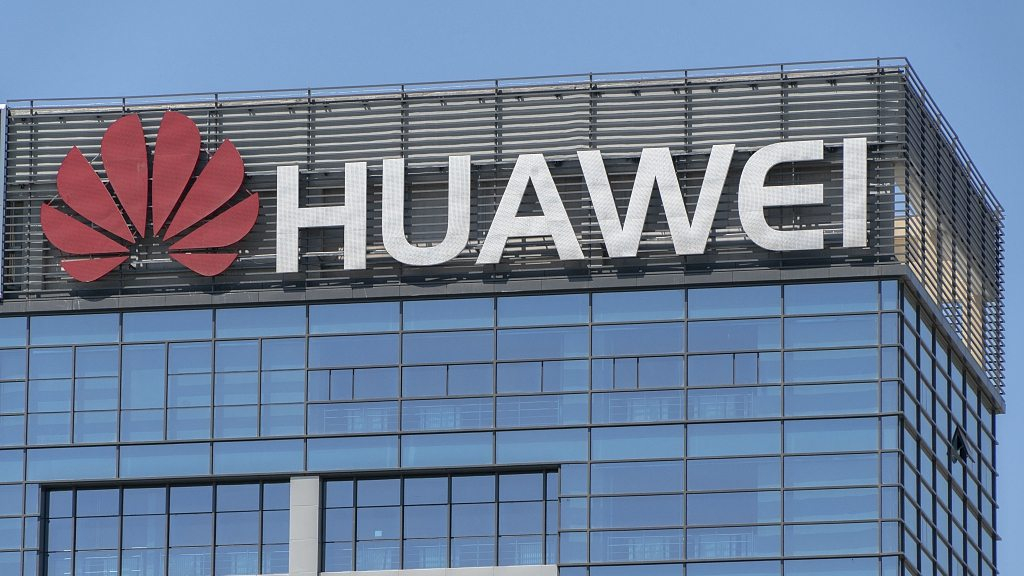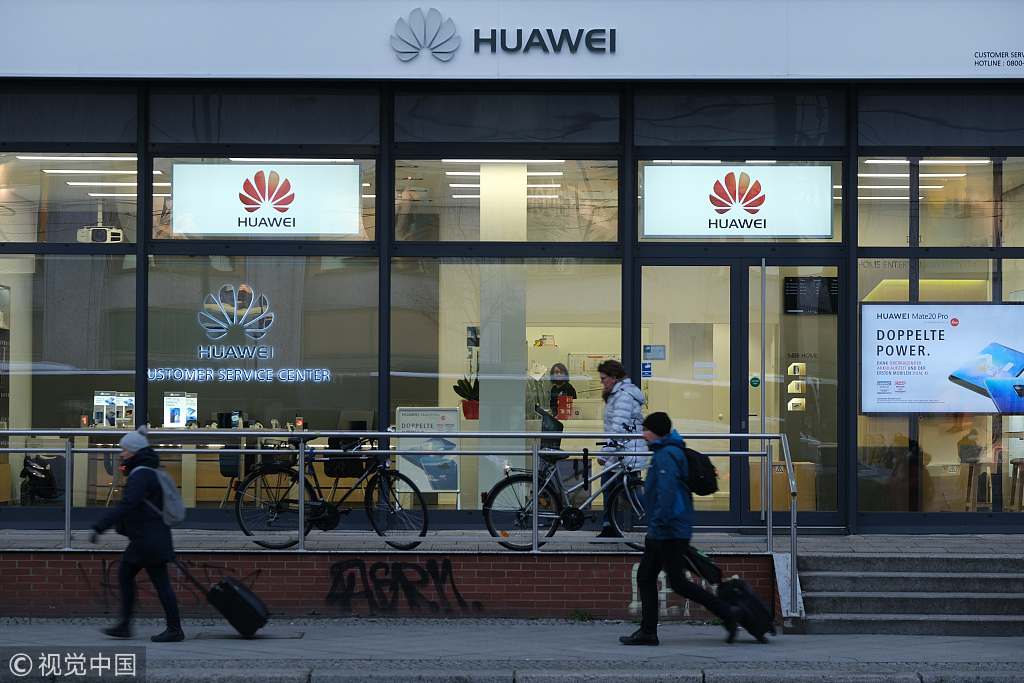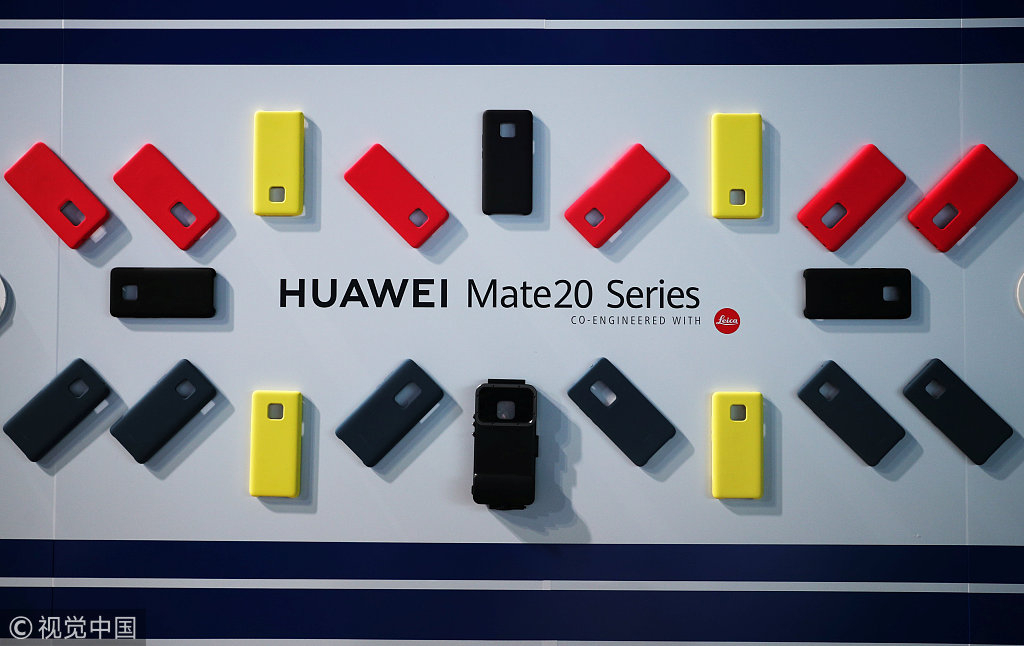
Opinion
11:21, 10-Jun-2019
Huawei: Innocent until proven guilty
Bobby Naderi

Editor's note: Bobby Naderi is a journalist, current affairs commentator, documentary filmmaker and member of the Writers Guild of Great Britain. The article reflects the author's opinion, and not necessarily the views of CGTN.
The basis for Western criminal law is that the accused is presumed innocent until proven guilty. This is what they regard as the presumption of innocence, or a triumph of rationalism over arbitrary persecution.
It is for having faith in the cornerstone of Western law that Huawei Chairman Liang Hua says he is willing to sign a "no-spy agreement" with the United States and other Western countries after Washington banned the Chinese telecommunications company. Liang believes the industry leader in 5G technology is on the right side of the law and that naysayers should reason about its guilt prior to any ban.

Huawei's customer service center in Berlin, Germany. /VCG Photo
Huawei's customer service center in Berlin, Germany. /VCG Photo
Enough of legal terminologies and jargons. The U.S. government cannot push other countries to ban Huawei for its alleged link to the Chinese government. Many have embraced the tech giant and its 5G technology, permanently exposing its guilt of spying for the Chinese government as a lie.
It is nearer to the truth to say that the U.S. government can still crawl its way to a moral high-ground and extend the presumption of innocence as a central pillar of its trade and technology policy with China. Huawei is innocent beyond a reasonable doubt and its rights to operate in the U.S. shouldn't be eroded or ignored based on mere allegations and politics. Washington shouldn't ask other countries to cast stones just because it has trade tensions and security concerns with China.
The chief security officer at Huawei Technologies USA, Andy Purdy, couldn't agree more. He says the Chinese telecom company is open to taking steps to address U.S. national security concerns.
Purdy, who formerly served as a cybersecurity official for Homeland Security, says, “We negotiate with respective governments on what kind of assurance framework they need. Some measures might include requirements around selling to the government or to critical infrastructure projects. I would be astounded if we weren't open to those kinds of risk mitigation measures.”
This should help cement the main argument that banning U.S. government agencies from buying Huawei's equipment doesn't benefit the U.S. economy. What's needed here is a risk-mitigation process, like those used in Europe, unless Trump's ban is part of a wider trade war with China.

A sign for the Huawei Mate20 smartphone series is seen at a launch event in London, UK, October 16, 2018. /VCG Photo
A sign for the Huawei Mate20 smartphone series is seen at a launch event in London, UK, October 16, 2018. /VCG Photo
There is no need to be in this situation and certainly no excuse for Trump to worsen the Sino-U.S. trade tensions. The UK's National Cyber Security Centre (NCSC) has said even if there are risks associated with Huawei's 5G rollout for the nation's next generation mobile network, they are manageable. More so, Huawei is reforming its approach to software engineering to win over more countries, including Germany and France. It has fulfilled promises to improve its methods, and Britain, Spain, Italy and others have all embraced its 5G.
Explain it as you will, but Huawei has taken the lead in global telecommunications and is in the same league as Microsoft and Google. The U.S. government cannot provide any evidence that Huawei equipment has backdoors. Allowing the company to be involved in the build-out of American 5G networks should raise no unmanageable security risks.
There are no structural issues either, and even if there's any, it can be addressed with third-party inspections, greater transparency, and a "no-spy agreement.” Even high-tech companies like Qualcomm, Intel, and Apple agree. They say the trade dispute could slow down the development of 5G in the U.S., which is why European countries are not banning Huawei. Given this reality and the fact that the U.S. offers them no alternative, they prefer to use Huawei's 5G equipment.
Of course, the jury is still out there and the facts matter. The U.S. government cannot provide any evidence of espionage, fraud and trade secret theft by Huawei. And it won't find any. Given the integrated nature of global technology and trade, it would be a very difficult if not impossible challenge for the U.S. to decouple its economy from the Chinese economy. Huawei is ahead of its time and its ban could prevent the U.S. from competing with other developed economies and securing its digital networks.
In this environment, what's needed is a triumph of rationalism over the arbitrary ban. The U.S. government can and should evaluate the facts, mitigate the risks, and proceed on a preliminary basis albeit with caution. There will always be security concerns over any advanced technology, yet the presumption of innocence should never give way to the presumption of guilt pre-trial.
(If you want to contribute and have specific expertise, please contact us at opinions@cgtn.com.)

SITEMAP
Copyright © 2018 CGTN. Beijing ICP prepared NO.16065310-3
Copyright © 2018 CGTN. Beijing ICP prepared NO.16065310-3